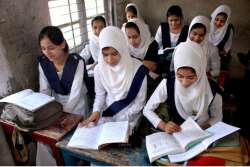COVID-19: J-K extends closure of schools, higher education institutions
Schools and higher educational institutions, including coaching centres, would continue to remain closed for onsite or in-person teaching till further orders, Chief Secretary A K Mehta said

The Jammu and Kashmir State Executive Committee (SEC) on Sunday extended the closure of educational institutions till further orders as it reviewed the COVID-19 situation in the union territory. Further, the committee said there would be no weekend curfews in any district but night curfews would remain in place from 8 pm to 7 am. It also capped the number of guests attending indoor or outdoor gatherings at 25.
In an order, Chief Secretary A K Mehta said it was observed that as compared to previous weeks, there were some improvements in many districts. "However, there is a need to continue with the existing Covid containment measures in all the districts in view of the uneven trend in the daily Covid cases," Mehta, the SEC chairman, said.
Schools and higher educational institutions, including coaching centres, would continue to remain closed for onsite or in-person teaching till further orders, Mehta said. Educational institutions are, however, permitted to seek personal attendance of limited vaccinated staff for administrative purposes, he added.
All deputy commissioners (DCs) have been directed to focus on the positivity rates of the medical blocks under their jurisdictions, the chief secretary said. "Intensified measures related to Covid management and restriction of activities shall be undertaken by the DCs in these blocks. There shall be renewed focus on panchayat-level mapping of cases, and micro-containment zones shall be constituted wherever unusual spike of cases is noticed," the order said.
It said deputy commissioners would keep active track of the positivity rates in the blocks and consider implementing stricter control measures in closed clustered spaces like public and private offices, community halls, malls and markets in case weekly positivity rates go beyond four per cent in these blocks.
"The three 'T' protocols of testing, tracking and treating, besides vaccination, need to be strengthened in these blocks. The proportion of RT-PCR tests in the total mix should be scaled up, on a best effort basis, to 70 per cent or more, excluding travellers," Mehta said. He said the positive cases detected as a result of intensive testing need to be isolated and quarantined at the earliest, and their contacts should also be traced fast, and similarly quarantined and tested, if needed.
The Health and Medical Education department was directed to ensure adequate availability of COVID-dedicated health and logistics (including ambulatory) infrastructure, based on their assessment of case trajectory. "National Health Mission in consultation with the DCs shall take up panchayat level mapping and data capturing for tracking the positivity rates on fortnightly basis in all panchayats," the order said.
Mehta directed district magistrates to strictly ensure that there is full compliance of COVID-appropriate behaviour, and defaulters are firmly dealt with under relevant sections of the Disaster Management Act and the Indian Penal Code. "The district magistrates shall constitute joint teams of police and executive magistrates for enforcement of Covid-appropriate behaviour. The joint teams shall submit daily reports regarding activities carried out by them and their assessment of compliance level," the order said.